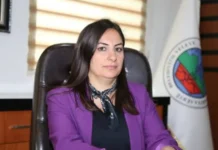Turkish poet Ahmet Telli has been handed down a suspended 10-month sentence on charges of spreading terrorist propaganda, Turkish Minute reported, citing the Media and Law Studies Association (MLSA).
Telli, 76, was sentenced by a high criminal court in Ankara on Tuesday on conviction of dissemination of terrorist propaganda due to the release of a 2017 statement to the press in which he participated and also read excerpts from one of his books.
The trial was followed by more than 50 rights activists from within and without Turkey.
The prosecutors in their opinion said Telli’s remarks during the reading of the press statement and excerpts from his poetry book constituted “terrorist propaganda” and that he should be given a prison sentence of up to eight years.
The statement to the press was made in Ankara on the occasion of the death of Ulaş Bayraktaroğlu, a founding member of the People’s United Revolutionary Movement who died while fighting Islamic State in Iraq and the Levant (ISIL) terrorists in the Syrian city of Raqqa in May 2017.
Telli said in his defense that he took responsibility for taking part in the release of the press statement and that his aim was to read a poem. He denied having been engaged in terrorist propaganda and asked for his acquittal.
In his statement at the time, Telli praised the legacy of Bayraktaroğlu, saying that he taught people how the “brotherhood of the peoples” could be achieved. “It is understood that this brotherhood will be won by fighting. His death has not taken him from us, but he has risen above and become our flag,” said Telli.
Telli’s lawyer, Umut Vedat Acar, said none of the other 75 people who took part in the release of the press statement who all faced criminal charges for their participation has been sentenced.
Although it is not stated in the court ruling, Telli was given the suspended sentence on charges of disseminating propaganda for the outlawed Kurdistan Workers’ Party (PKK), listed as a terrorist organization by Turkey and much of the international community.
It is common in Turkey, which has a poor record on freedom of expression, for intellectuals and activists to face terrorism-related charges due to their statements.
The Turkish government has been harshly criticized for silencing dissent and jailing the critics of its policies.















